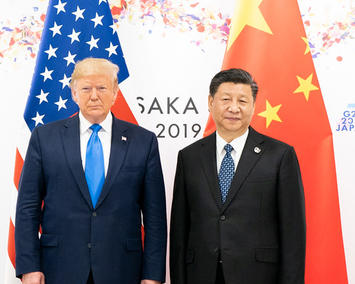
For the past half century, China has gone from successfully exploiting global markets to seeking to impose its own authoritarian system on the rest of the world. This winter is all about much of the rest of the world saying, “No thanks.”
The poor handling of the coronavirus represents the third element in a hockey-like hat trick of remarkably embarrassing failures. The virus story tells of a litany of filthy market conditions, incompetent governance and bureaucratic languor. This simply amplifies the pattern seen in other awful actions such as the suppression of Uighurs, complete with concentration camps and forced labor, and the brutal suppression of Hong Kong’s democracy protesters.
All these developments suggest that it is well past time to start what one analyst at the American Interest described as a “hard decoupling” by the West, and much of the world, from China.
Breaking up is hard to do
China has depended on foreign markets to boost its share of the world’s economic output, according to the World Bank, from 4 percent in 1990 to a projected 21 percent in 2022. But, for America and much of the high-income world, this growth has come at the price of reliance on China for everything from manufactured goods to capital. Decades of dependency have weakened our own industrial base, while allowing many critical skills to decline here and in other parts of the West.
This is most painfully evident in the consumer electronics and tech sector, most notably Apple, which is almost completely dependent on production from China. Even our military sources key parts from the same nation whose prime strategic goal is to eject us from the Pacific Basin.
De-coupling from dependent relationships is never easy, and this won’t be either. Yet since President Trump’s election, there has been pressure to shift production to other, less threatening countries or, even better, bring it back here. The tariff regime, imposed with the usual mercurial touch that characterizes all things Trump, has been a blunt instrument, but it already has spurred moves by some companies to reduce our dependence on a China-centered supply chain.
The key thing now is whether the Democrats, as well as Wall Street’s reliable GOP shills, have learned anything from 2016 and not try to block a “hard de-coupling.” Under Sen. Bernie Sanders, resistance to China would be likely, but the globalists around Biden may prefer to go back to conditions that enrich the corporate suite but leave most Americans poorer.
Understanding China’s regime
As someone who has visited China numerous times over nearly four decades, it is impossible not to marvel at the enormous accomplishments of the current regime. Streets once choked with bicycles and horse-drawn carts are now filled with cars and serviced by sleek trains. Yet the trappings of modernity have not made China adopt a more Western approach to governance, as was once widely predicted by the mainstream punditry.
Instead China is demonstrably more authoritarian and committed to thought control than just a decade ago.
Technology, rather than promote China’s integration into the world, is now being deployed, with help from big tech firms like Apple, Google and IBM as part of a surveillance regime.
In the process China is creating an impressive and distinctly separate tech ecosystem. It allows for the prospects of social control more subtle, and perhaps even more inescapable, than anything Stalin or Mao could dream up.
This is not merely an attempt to be more economically competitive. It is now part of a national system of control, which the country’s science fiction writers — one of the last bastions of self-reflection there — almost uniformly see as becoming ever more repressive.
The right response
Arguably those against de-coupling will be include interests who wish to keep tapping capital and products from China in part to secure their own oligopolies. Yet the middle and working classes around the world need to insist that Western-oriented countries remain true to their own values, place a higher value on national security and health than the profits of a few large institutions.
Sadly, some in academia and the media regard the ascendancy of China’s “stronger government” as inevitable. But as the repressing of the Uighurs and Hong Kong make clear, Chinese leaders can no longer maintain power without resorting to brutal measures.
Other vulnerabilities such as a looming demographic decline, including a record low birthrate, massive corporate debt, a history of environmental disasters and serial pandemics do not suggest the presence of an unassailable super power.
As long-time democracy campaigner Jimmy Lai says, nothing can address China’s malignant impact on the world other than “the collapse of the party.” To achieve this over the long run, we don’t need to engage militarily or talk loudly but simply stop supplying the rope for them to hang us with.
None of this suggests that a decoupling will be painless, particularly in states like California. But in the end, better to pay a few bucks more at the store and suffer a drop in stock values than see our national security and health standards threatened, productive jobs eradicated and our real estate markets distorted.
Rather than see the virus as simply a tragedy, China’s growing isolation and loss of prestige could present an opportunity to stand up against an authoritarian nightmare far more frightening even than the current pandemic.
This piece first appeared on the Orange County Register.
Joel Kotkin is the Presidential Fellow in Urban Futures at Chapman University and Executive Director for the Center for Opportunity Urbanism. His last book was The Human City: Urbanism for the Rest of Us (Agate, 2017). His next book, The Coming of Neo-Feudalism: A Warning to the Global Middle Class, is now available to preorder. You can follow him on Twitter @joelkotkin
Photo: Whitehouse via Flickr in Public Domain.












